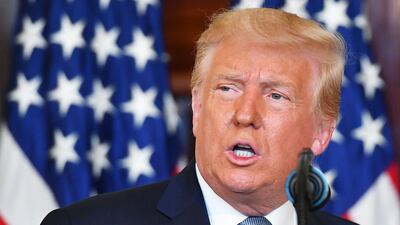The Trump campaign’s interactions with Russian intelligence services during the 2016 presidential election posed a “grave” counter-intelligence threat, a Senate panel said on Tuesday.
The panel explained in a report how associates of the Republican candidate had regular contact with Russians and expected to benefit from the Kremlin’s help.
The report, the fifth and final from the Republican-led Senate intelligence committee on the Russia investigation, describes how Russia launched an aggressive, wide-ranging effort to interfere in the election on Donald Trump’s behalf.
It was published on Tuesday, as the Democrats formally pick their candidate to challenge Mr Trump in this year’s vote in November.
The report says Trump associates were eager to exploit the Kremlin’s aid, particularly by maximising the effect of leaked Democratic emails that were hacked by Russian military intelligence.
The conclusions mark the culmination of a bipartisan investigation lasting more than three years and produced what the committee called “the most comprehensive description to date of Russia’s activities”.
The findings echo to a large degree those of special counsel Robert Mueller’s investigation, with its unflinching description of interactions between Trump associates and Russian operatives.
It contradicts the Republican president’s claims that the FBI had no basis to investigate whether his campaign was conspiring with Russia.
Among the more striking sections of the nearly 1,000-page report issued on Tuesday is its description of the close professional relationship between former Trump campaign chairman Paul Manafort and Konstantin Kilimnik, who the committee describes as a Russian intelligence officer.
“Taken as a whole, Manafort’s high-level access and willingness to share information with individuals closely affiliated with the Russian intelligence services, particularly Kilimnik, represented a grave counter-intelligence threat,” the report says.
It notes how Mr Manafort shared internal campaign polling data with Mr Kilimnik and says there is “some evidence” that the Russian may have been connected to the Kremlin’s operation to hack and leak Democratic emails.
The report also says that “two pieces of information” raise the possibility of Mr Manafort’s potential connection to those operations, but what follows next in the document is blacked out.
Both men were charged in Mr Mueller’s investigation, but neither was accused of any tie to the hacking.
A lawyer for Mr Manafort, Kevin Downing, said there was information that was sealed at the request of Mr Mueller’s team “that completely refutes whatever the intelligence committee is trying to surmise".
“It just looks like complete conjecture,” Mr Downing said.
The report deliberately avoids a final conclusion about whether there is enough evidence that Trump’s campaign co-ordinated or colluded with Russia to sway the election away from Democrat Hillary Clinton.
It leaves its findings open to interpretation.
A group of Republicans on the panel submitted “additional views” to the report, saying that it should state more explicitly that Trump’s campaign did not co-ordinate with Russia.
But Democrats on the panel submitted their own views, arguing that the report clearly shows such co-operation.


